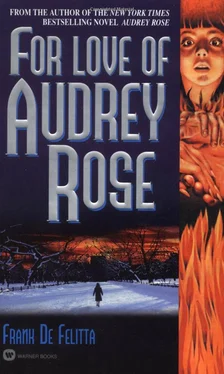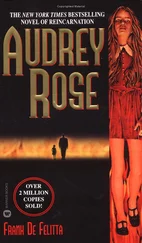Mehrotra spoke rapidly, pointing to Janice. She thought she heard Elliot Hoover’s name mentioned. Then he identified the family to her, one by one.
“My sister, Aliya. Her mother-in-law and the children. They’re Aliya’s.”
Aliya smiled pleasantly.
As Mehrotra chatted with his sister, deferring in his speech to the mother-in-law, Janice looked around at the children. They huddled at the door, and when they saw her looking, they ran back into the kitchen. The enormous depths of the black eyes startled her. They were like shaded pools, naive, and troubling in their purity.
Aliya gently handed Janice a cup and saucer, then set a strainer on the cup. The tea burbled musically into the small chinaware. Aliya did the same for Mehrotra and the motherin-law, casting shy glances at Janice.
“Arun!” Mehrotra called.
Shyly, a slender boy, about ten years old, emerged from the kitchen and nestled himself onto Mehrotra’s lap.
“Now,” Mehrotra said, “my sister’s mother-in-law will tell you the story of her Uncle Vinoba.”
Mehrotra directed the mother-in-law to begin. The lady had a slightly humped back, so she had to move the chair to face Janice.
“I will translate,” Mehrotra said.
The woman began. The language did not seem even to have syllables, only melodic rambling.
“She is speaking a very old dialect,” Mehrotra whispered, “about the days of her mother. It was when the British were in India. She always begins the same way.” Mehrotra translated: “In those days, not far from here, the British had rubber plantations. But they always made the men elect a foreman of their own choosing to be the go-between. In this way, they controlled the workers more easily.”
The aged voice continued.
“Now Uncle Vinoba wanted to be that foreman. After all, the pay was good, he could have a hut to himself and sometimes wear the company watch on a chain.”
Janice leaned toward Mehrotra to hear better.
“Now, in those days, there were always rebellions in the rubber plantations. Uncle Vinoba ingratiated himself with the workers. But also with the British. To make a long story shorter, he was elected to lead a rebellion. Now this was very bad, because he was afraid of the British. But he did not want to anger the rebels. So he said yes.”
Janice nodded, sensing Mehrotra waited for a reaction. The old woman rattled on.
“The rebellion was planned for the full moon. One group would attack the soldiers on the north road. One group would sneak into the company headquarters and kill the British. Naturally, as leader, Uncle Vinoba would go to the headquarters.”
Janice watched the children. Now they sat quietly in the room on the floor, as though eager to hear the story over again. Some of them anticipated, their mouths moving, as though they had nearly memorized it.
“Suspecting nothing, the men watched Uncle Vinoba walk to the headquarters building. But when he got inside, he told the British everything. A messenger sneaked out the back way to alert the soldiers. Guns were brought down from upstairs. Then Uncle Vinoba went back to the rebels.”
The old woman took a very deep breath and suddenly leaned forward.
“Well, Uncle Vinoba sweated like a pig. But exactly at midnight he led the men forward. They tiptoed up the red carpets — the British love red carpets — Uncle Vinoba in front. All at once, the British jumped out from the side of the stairwell, from the bottom floor, and down from the upstairs. An enormous roar of gunfire, and all the rebels were killed. Except Uncle Vinoba. It was said that the blood was found even on the ceiling.”
There was a long pause. The old woman fanned herself with a paper and bamboo fan.
“Uncle Vinoba became the foreman. He lived alone, never married, and always carried a knife with him, even though he never cut the rubber himself. After all, most of the workers were related to the dead men.”
Mehrotra patted Arun on the stomach. Arun giggled.
“One night, about a year later, the widows broke into his hut. They grabbed him, tied him up, and dragged him screaming out into the forest. There they secured him between two rubber trees. The elephants were brought in, and for each man who had died, an elephant was made to step on him. That was twenty-one times, because there were fifteen in the fields and six killed in the headquarters. Anyway, his screams echoed all over the plantations. The soldiers were too frightened to come, because they thought it was an unnatural sound, or maybe the wild dogs from the mountains. In the morning the British found a length of rope, broken ferns all around, and tangled-up pieces of broken, red bones. Poor Uncle Vinoba.”
The story went on, but Mehrotra ignored the old woman.
“Now, Mrs. Templeton. There are fifteen dead men in the fields. Six in the headquarters. How many is that?”
“Twenty-one.”
Mehrotra lifted Arun’s shirt. Spread across his back, in uneven double rows, were peculiar cherry red markings, like scallops in shape. Their shape fascinated Janice. They were almost delicate, not at all gruesome or disfiguring, and Arun smiled shyly.
“Have you ever seen an elephant’s footprint?” Mehrotra asked.
She looked at him, startled.
“Look, Mrs. Templeton. Here are the toes, the heavy weight at the back, where the marks are thicker.”
She found it difficult to believe.
“Twenty-one marks, Mrs. Templeton,” Mehrotra said measuredly. “Five years ago, when we visited our cousins where the rubber plantation used to be — it’s a shirt factory now — Arun became very frightened, and he did not know why. Now he will tell you what he said.”
Mehrotra whispered in the boy’s ear.
Arun turned to face Janice, closed his eyes, and with difficulty, formed the words, “I — hear — guns.”
“See?” Mehrotra demanded. “‘I hear guns.’ In English, Mrs. Templeton! And he never studied English, then or now!”
“I — hear — guns,” Arun repeated, pleased at the reaction.
Arun slid off his lap, and went to join the other children.
“Every village, every town, every quarter of every large city is filled with these stories. A girl has the markings of a dead aunt. Or a man suddenly acts strangely and speaks a different dialect. Or a child must visit a certain area where he has never been. Why? Because they are the living incarnations of the dead! That’s why! Believe, Mrs. Templeton!”
Janice followed Mehrotra back into the brilliant sunshine that poured upon the multitudes who pressed upon the sacred Ganges. He took her by the elbow and led her through waves of ascetics and urban faithful.
“About Elliot Hoover,” Janice stammered.
“I was afraid — I must confess — you had some romantic interest,” Mehrotra shouted above the prayerful cacophony. “I protect him.”
“Then you can tell me where he is?”
“Elliot Hoover is at an ashram on the Cauvery River.”
“Where is that?”
“In the State of Tamil Nadu.”
“Is there a telephone there?”
Mehrotra laughed. “Not at the ashram. And it will take at least a week, if you are lucky, for a letter to find its way into the mountains.”
Mehrotra pulled her gently toward him, just as an ox cart lumbered by, dropping loose sticks of firewood for the Ghats. He felt her trembling.
“I think you must go yourself,” he said quietly. “It is the quickest.”
Janice looked at the round, still-unshaven face, the owl glasses, and she saw the steadfast darkness of his eyes, the unwavering compassion. She knew now why he and Elliot Hoover were friends.
“I think I’d be afraid to,” she said weakly.
“Afraid? Of India? Don’t travel after dark, that’s all.”
Читать дальше












